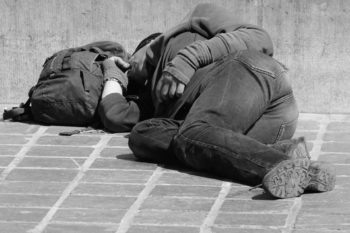As temperatures drop below zero, health and homelessness organisations have warned that lives will be lost this winter unless rough sleepers can find safe and warm shelter.

Charities are urging the government to fund socially-distanced accommodation for homeless people so that they are away from the cold and not threatened by COVID-19.
Homeless people have been unable to follow government guidelines of staying at home. Over the colder months, this has resulted in an increase in rough sleepers turning towards shelters, where social distancing measures are not always followed. Some shelters are overcrowded and unsanitary, which has contributed to the rapid spread of the virus.
Some charities are worried that, without help from councils, more homeless people will be forced to stay in communal night shelters, where the risk of transmission is higher. Rough sleepers are now faced with two options: sleep on the street and risk hypothermia or turn to a shelter with the possibility of COVID-19 infection.
Organisations are calling for a repeat of the government’s Everyone In scheme, which saw 150,000 homeless people moved into safe emergency accommodation towards the beginning of the pandemic.
Since April, thousands of people have been made homeless due to loss of work – especially in the hospitality industry – or have struggled to support themselves financially. Despite government assurance that renters would be protected from eviction, thousands have still ended up on the streets.
Framework, a homelessness charity, helps rough sleepers with a range of needs, such as housing, health and employment in several areas, including Lincolnshire, Derbyshire, Nottingham and Sheffield.
“The three hooks to our core message are prevention, rough sleeping and resettlement. A lot of our work is helping to stop people becoming homeless in the first place,” said a spokesperson from the organisation.
In Lincolnshire, Framework is also working on property development to directly house rough sleepers from the street.
“We run employment services so that, if we can get someone a job, they can have their own income. That is a way of preventing homelessness and poverty, as one of the main reasons people become homeless is because of poverty,” the spokesperson said.
During the last big appeal, Framework was able to give 300 mobile phones and SIM cards to those facing isolation alone. “We were also able to deliver 20,000 meals, 1,500 food parcels and things such as Easter eggs and nappies for babies through donations,” said the charity’s spokesperson.
Public donations also helped to keep hostels open during a time when staff and volunteers were unable to work.
Homeless people are now not only facing the threat of the novel coronavirus, but also the risk of developing conditions such as frostbite and hypothermia.
And charities, working to get rough sleepers into warm accommodation where they can start to rebuild their lives, are also facing the financial backlash of the pandemic.

